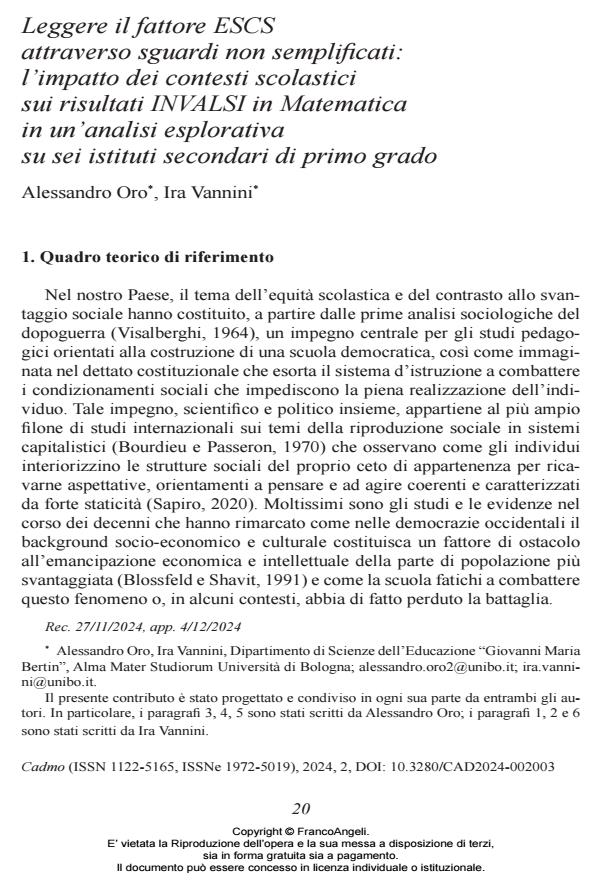Leggere il fattore ESCS attraverso sguardi non semplificati: l’impatto dei contesti scolastici sui risultati INVALSI in Matematica in un’analisi esplorativa su sei istituti secondari di primo grado
Titolo Rivista CADMO
Autori/Curatori Alessandro Oro, Ira Vannini
Anno di pubblicazione 2025 Fascicolo 2024/2
Lingua Italiano Numero pagine 24 P. 20-43 Dimensione file 364 KB
DOI 10.3280/CAD2024-002003
Il DOI è il codice a barre della proprietà intellettuale: per saperne di più
clicca qui
Qui sotto puoi vedere in anteprima la prima pagina di questo articolo.
Se questo articolo ti interessa, lo puoi acquistare (e scaricare in formato pdf) seguendo le facili indicazioni per acquistare il download credit. Acquista Download Credits per scaricare questo Articolo in formato PDF

FrancoAngeli è membro della Publishers International Linking Association, Inc (PILA)associazione indipendente e non profit per facilitare (attraverso i servizi tecnologici implementati da CrossRef.org) l’accesso degli studiosi ai contenuti digitali nelle pubblicazioni professionali e scientifiche
This study examines the interplay between students’ socioeconomic and cultural status (ESCS) and their performance in mathematics, focusing on disadvantaged school contexts in Italy. Despite the democratic ideal of education as a tool for equitable intellectual and economic emancipation, numerous studies highlight persistent disparities tied to socioeconomic background. These disparities are particularly pronounced in Italy, where ESCS remains the most significant predictor of performance variability in national (INVALSI) and international assessments (OECD, IEA), with a marked North-South divide. The research explores the evolution of students’ mathematics scores in schools situated in socioeconomically disadvantaged areas, focusing on changes observed diachronically before and after the Covid-19 pandemic. It also examines the relationship between individual ESCS and academic performance over time across different school contexts. To address these questions, the study analyzed mathematics INVALSI data from 2019, 2021, 2022, and 2023 for eighth-grade students from six lower secondary schools in economically disadvantaged areas spanning North to South Italy. Using descriptive analyses and moderated linear regression models, the study explored interactions between students’ ESCS and school affiliation. Results revealed a notable trend in one specific school: by 2023, individual ESCS no longer significantly influenced mathematics performance. This finding suggests potential shifts in school practices or external factors mitigating the impact of socioeconomic background on academic achievement. The implications of these results, particularly in light of the broader educational equity discourse, are discussed in detail in the full article.
Parole chiave:educational equity, sisadvantaged school contexts, socioeconomic disparities, mathematics achievement, INVALSI assessments.
Alessandro Oro, Ira Vannini, Leggere il fattore ESCS attraverso sguardi non semplificati: l’impatto dei contesti scolastici sui risultati INVALSI in Matematica in un’analisi esplorativa su sei istituti secondari di primo grado in "CADMO" 2/2024, pp 20-43, DOI: 10.3280/CAD2024-002003